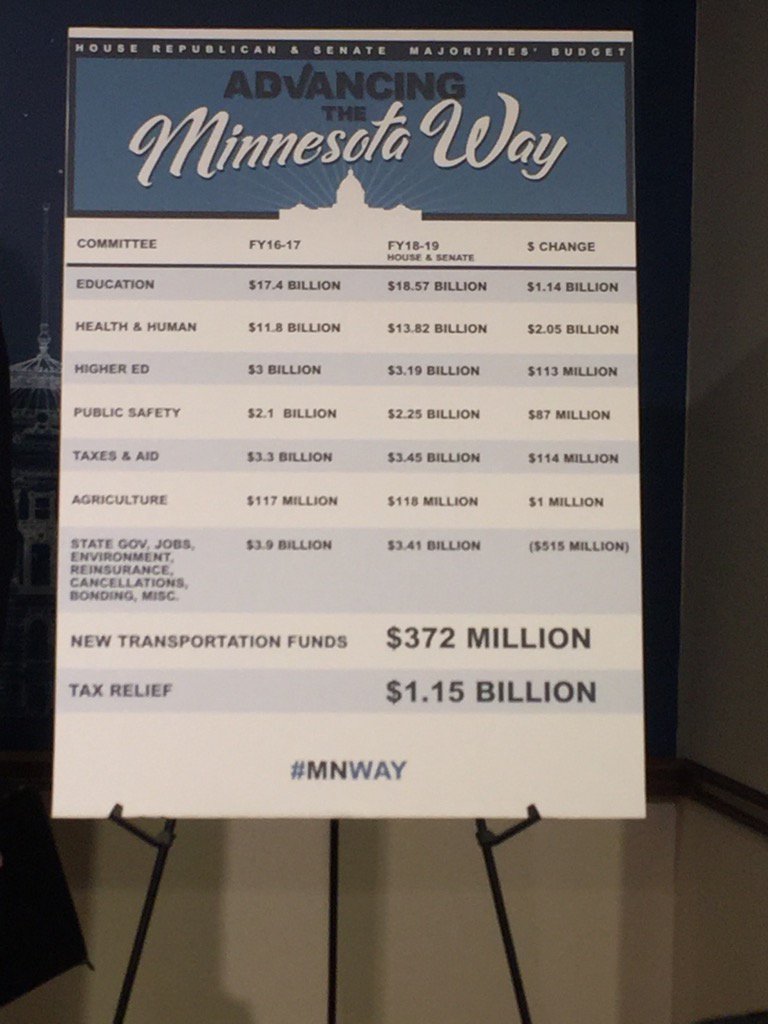News on MSBA's Platform Issues
_________________
MSBA 2017 Platform
 Key Platform Provisions are:
- Investing in All of our Students
- Ensure Every Student has a Qualified and Committed Teacher
- Support the Work of Locally Elected School Boards
- Equity And Student Achievement
- 21st Century Facilities
|
|
| Indicates a MSBA Initiative |
Join us on
 and
 and help us spread the word.
My Legislators
|
|
Runs, Resources and Side-by-Sides
|
|
|
Monday Legislative Briefing
|
|
May 1, 2017 - Week 18
|
|
A Legislative Alert from the GR Team
|
|
Teacher Licensure - We Need to Pass a Teacher Licensure Reform Bill This Session.
|
|
Teacher Licensure
Teacher licensure could very well be the one of the biggest reform bills we have seen in recent years. MSBA has actively worked to simplify and streamline teacher licensure through the lens of the teacher shortage issue. Finally, this session we have two strong teacher licensure bills, authored by Rep. Erickson and Sen. Pratt.
 Please contact the conferees and let them know we need the flexibility and simplicity these bills provide. For more detail on both bills please, see the section on teacher licensure reform.
Teacher Licensure Conference Committee
House: Erickson (Chair), Bennett, Mariani
Senate: Pratt (Chair), Housley, Kent
|

Two-Way Targets Released
At the request of the Gov. Dayton, Friday morning the
House and Senate leadership released their targets, which they described as "two-way targets" for the committees to work with. E-12 Education was allocated $296 million; a disappointing $75 million short of the 2 percent increases. The governor and leadership are expected to release the three-way targets by next Thursday.
 Your voice continues to be needed in these negotiations to let leadership know the "two-way target" is simply not enough to meet ongoing needs of school districts.
Joint Press Conference - Targets Released
|
__________________________________________
|
|
Conference Committee Meetings
Teacher Licensure Reform
The work of the Legislative Study Group on Educator Licensure has culminated in two bills, authored by Rep. Erickson and Sen. Pratt, seeking a single governance board and tiered-licensure system.
Both bills abolish the Board of Teaching and transfer all teacher licensure activities to a newly created Professional Educator Licensing and Standards Board. MSBA strongly believes a single entity is needed to provide a new start and greater clarity for all.
MSBA advocates for at least one sitting school board member to be appointed to the board. We strongly support the appointment of a school district human resource representative as well, who knows firsthand the issues with hiring and retaining teachers.
The second major overhaul is moving to a four-tier licensing structure that will simplify and streamline the Minnesota teacher licensure process and allow for a natural progression.
Both bills eliminate complicated language and processes, replacing it with a more open and flexible system to accommodate the full spectrum of needs in classrooms. The first two tiers accommodate community experts and move to fully credentialed five-year licensed teachers in later tiers. The goal is to put a highly qualified licensed teacher in every classroom.
Here are some general highlights, similarities and differences of each tier in both bills.
Tier-1
Both bills recognize the need for career and technical instructors who may not have a traditional teaching degree and don't wish to return to school to attain a teaching license, but do have significant professional experience. Both bills also allow school districts the authority to hire and provide a tier-one license for one year. The House allows for three automatic renewals and the Senate allows for unlimited renewals.
Tier-2
Both bills provide a menu of credentialing options where the candidate must qualify for at least one component for licensure. The House and Senate differ on duration and renewal timelines. Another major difference is the House does not allow Tier-2 to count toward continuing contract tenure rights and Senate provides that Tier-2 counts toward continuing contract if a candidate obtains Tier-3 or Tier-4.
Tier-3
Both bills provide a menu of options to qualify for a teaching license to progress to a Tier 4 license. They also differ with exams. The Senate requires a candidate to pass the board adopted skills exam; however, there is an alternative assessment provision if it is failed.
Tier-4
Both House and Senate require meeting all components of Tier-3, plus passing a skills exam. The Senate provides an alternative assessment exam if it is failed. Both bills also require three years teaching experience. The House specifies it must be in Minnesota only and the Senate allows experience from any state.
With a teacher shortage of near epic proportions throughout Minnesota, especially in rural areas, the tiered system creates alternative pathways to putting a high-quality teacher in a classroom.
MSBA believes the time has come to adopt a new teacher licensure model to meet the needs of a 21st century workforce. Today, schools are responsible for preparing all students for career or college paths. We also believe the time has come to trust the judgment and decision-making authority of school boards to determine whether the candidate has the appropriate skills and credentials.
The Teacher Licensure Conference Committee will continue going through side-by-sides of the bills and adopting same and similars.
|
E-12 Finance Conference Committee
-
The E-12 Conference Committees met Thursday morning. They adopted the similars of the bill - the House version of E-Learning and the Senate's extension of food service contracts. The discussion then moved on to the Crosswinds building and what could happen to it.
-
The committee will meet on Monday and is expected to have a bill ready to present to Governor Dayton by the end of the week.
E-12 Conference Committee:
House: Loon (Chair), Erickson, Bennett, Kresha and M. Murphy
Senate: Nelson (Chair), Pratt, Weber, Eichorn and Wiger
|
Pensions
The Legislative Commission on Pensions and Retirement has a full slate of meetings scheduled the first week in May. The pensions bill is expected to be introduced anytime.
|
State Government Finance
On Thursday, the House and Senate conference committee members voted to include the bill (SF 1321 Dahms/HF 1558 Kresha) on school district insurance coverage for employees. Specifically, the language adopted today would:
- Remove the requirement that school districts request a proposal from the Public Employee Insurance Program (PEIP).
- Allow school districts to have health insurance contracts up to four years in length.
- Require the exclusive representative for the largest group of employees to comply with the requirements of the school district group health insurance bidding process. This would restrict the largest union from opting out of the school district health insurance program.
- Allow service cooperatives to be self-insured.
|
Elections
The Senate moved the Omnibus Election bill (
S.F. 514/
H.F. 729) forward with a beneficial amendment regarding school board vacancies. The amendment offered by Chair Kiffmeyer would allow a local school board to replace a member by appointment and hold a special election in November at the general election. If a board member leaves within 90 days of general election the board position will be appointed to serve until the next general election of the next year.
This change would end the requirement that school board vacancy be filled with a separate standalone election. Presently 14 districts have lost members and with the exception of two, all the rest must run a special election to fill the empty seat.
The House elections bill will now move through Ways and Means then to the House floor.
|

Informational Hearing for Pipeline Assessments - May be a concern for school districts
The Senate Tax Committee held an informational hearing Thursday, April 20, on the assessment process for utility companies. The issue has become
increasingly relevant for school districts. The Department of Revenue and
Enbridge have failed mediation efforts and are headed to court. If Enbridge is successful in arguing for reduced assessments, some school districts could be on the hook for millions. The pipeline runs across 13 northern Minnesota counties and through at least eight school districts. MSBA testified with significant concerns about the impacts of the utility assessment issue, which may require repayment of the school districts tax payments.
The Enbridge challenge covers five years of property taxes from 2012 through 2016. If the challenge is successful, local units of government hosting pipeline
property owned by Enbridge Energy Partners, would be required to refund overpaid property taxes. In some cases it may be significant relative to impacted city budgets.
The state also levies a property tax on pipeline property, and the outcome of the case could also impact the state budget.
While the Minnesota Department of Revenue determines the taxable valuation of pipelines and other property, such as railroad and utility property, that valuation is subsequently included in the property tax base of local school district of government and thus the pipeline owner pays local property taxes.
Earlier this session, bills were introduced to make the state responsible for the repayment of overpaid local property taxes related to state-assessed property. The bills, HF 1628 (Rep. Debra Kiel) and SF 1630 (Sen. Paul Utke), were heard in the House and Senate taxes committees, but were not included in either the House or the Senate versions of the omnibus tax bill. However, the hearing is an indication that the issue is still under consideration this legislative session.
Minnesota hosts several other pipelines and other utilities that are also assessed by the state, and future valuation challenges of other systems are always a possibility.
Special thanks to Matt Hilgart from the Association of Minnesota Counties and Gary Carlson from the League of Minnesota Cities.
|
Every Student Succeeds Act (ESSA)
Recently, the Minnesota Department of Education (MDE) released an update with their preliminary decisions for the Every Student Succeeds Act (ESSA) plan. MDE has worked with hundreds of stakeholders in more than 300 meetings over the last year to shape Minnesota's ESSA plan. The ESSA plan has five indicators that will be the accountability system.
Indicator 1 - Academic Achievement: All Schools and Indicator 2 - Academic Progress: Elementary and Middle Schools
The first indicator uses an "achievement index" giving half points for students in the "partially meets standards" achievement level and full points for those meeting or exceeding standards, for math and reading. The second indicator uses a "transition matrix" and will award points for students increasing achievement levels in math and reading tests.
Indicator 3 - Graduation Rate: High Schools
The third indicator will use a school's four- and seven-year graduation rates and will require separate reporting on the Minnesota Report Card. High schools with a four-year graduation rate below 67 percent overall or in any individual student group will be identified for support. Using current data, 193 high schools would be identified as such.
Indicator 4 - Progress Toward English Language Proficiency: All Schools
Our English Learners will use a "growth index" for individual scores on the new ACCESS test.
Indicator 5 - School Quality/Student Success: All Schools
The fifth indicator has been determined to be chronic absenteeism. Data collected in the 2016-17 school year will be utilized for accountability purposes in the 2017-18 school year. Chronic absenteeism is defined by missing 10 percent or 17 days of school. In later years, well-rounded and career and college readiness data will be added to the accountability system as available.
MSBA is concerned with where the resources will come from to gather and report data used in each indicator. There is also a concern over equity; especially when looking at chronic absenteeism.
With regard to assessments, MDE will continue to move forward with the Assessment Work Group to take advantage of the flexibility offered by ESSA. MSBA's Denise Dittrich has been involved with the assessment committee from the beginning and will continue work with the group to explore consideration of the nationally recognized ACT as an alternative to high school MCAs.
Beginning now and through June, the department will "put pen to paper" in solidifying the plan. It will then be available in August for public input and will be submitted to the U.S. Department of Education in September.
Our blog,
The Advocate, has a more detailed look and supporting materials.
|
Join Us 
Join us in a "Tweet-a-Thon" over the next week. We will be tweeting why the House and Senate targets won't meet schools needs.
Please watch our Twitter feed and retweet. Or tweet your own reasons how this will impact your district. Some examples are:
"Schools need at least a 2 percent increase on formula because ..."
"Without at least a 2 percent increase, we will cut ..."
Share photos of students, board sessions, negative numbers in your budgets, etc. in your tweets.
Looking Forward
The Teacher Licensure Conference Committee will meet Monday morning in the Basement State Office Building for a walk-through of side-by-side of the teacher licensure bill (
H.F.140).
Testimony will be heard from the Board of Teaching and the Minnesota Department of Education.
The Education Omnibus on HF890 (Omnibus Education Finance Bill) will be heard Monday at 3 p.m. or at the Call of the Chair in room 200 State Office Building.
At the Call of the Chair Monday, the Conference Committee on H.F. 4 the Tax Omnibus bill will be heard in room G-15 Capitol.
Don't forget you can watch many of these proceedings on the House and Senate media channels.
|
 |
 |
|
|